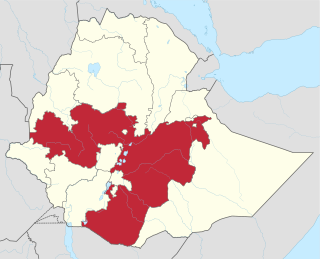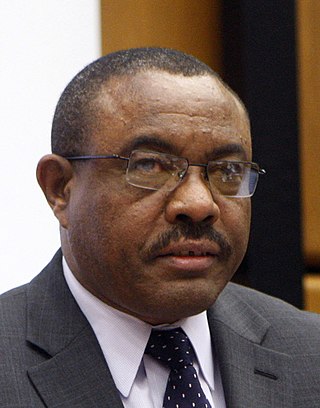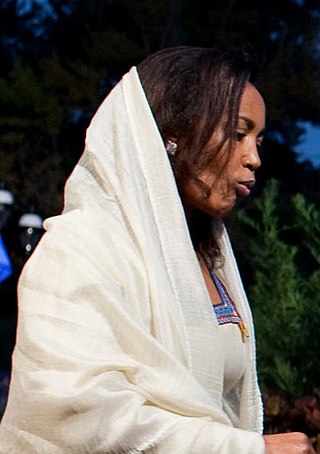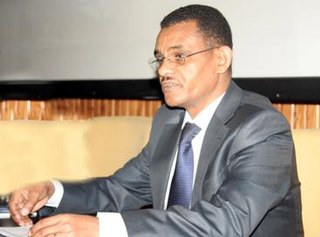
The politics of Ethiopia are the activities associated with the governance of Ethiopia. The government is structured as a federal parliamentary republic with both a President and Prime Minister. The legislature is multicameral, with a house of representatives and a council. The term politics of Ethiopia mainly relates to the political activities in Ethiopia after the late 20th century when democratization took place in the nation. The current political structure of Ethiopia was formed after the Tigrayan People's Liberation Front (TPLF) overthrew dictator President Mengistu Haile Mariam in 1991. A general election was held in June 1994 and Ethiopia has maintained a multiparty political environment until today.

Meles Zenawi Asres, born Legesse Zenawi Asres was an Ethiopian politician and a former anti-Derg militant who served as president of Ethiopia from 1991 to 1995 and as prime minister from 1995 until his death in 2012.

The Ethiopian People's Revolutionary Democratic Front was an ethnic federalist political coalition in Ethiopia that existed from 1988 to 2019. It consisted of four political parties: Tigray People's Liberation Front (TPLF), Amhara Democratic Party (ADP), Oromo Democratic Party (ODP) and Southern Ethiopian People's Democratic Movement (SEPDM). After leading the overthrow of the People's Democratic Republic of Ethiopia, it dominated Ethiopian politics from 1991 to 2019. In November 2019, the EPRDF was dissolved, and Prime Minister and EPDRF chairman Abiy Ahmed merged three of the constituent parties into his new Prosperity Party, which was officially founded on 1 December 2019.

Oromia is a regional state in Ethiopia and the homeland of the Oromo people. Under Article 49 of Ethiopian Constitution, the capital of Oromia is Addis Ababa, also called Finfinne. The provision of the article maintains special interest of Oromia by utilizing social services and natural resources of Addis Ababa.

Negasso Gidada Solon was an Ethiopian politician who was the president of Ethiopia from 1995 until 2001.

Moyale is a city situated on the border between Ethiopia and Kenya. In Ethiopia, it serves as the administrative centre for two Ethiopian woredas: Moyale of the Oromia Region and Moyale of the Somali Region. In Kenya, it is the largest town in Marsabit County and the capital of Moyale sub-county.

Hailemariam Desalegn Boshe is an Ethiopian politician who served as prime minister of Ethiopia from 2012 to 2018. He also previously served as deputy prime minister and Minister of Foreign Affairs under Prime Minister Meles Zenawi from 2010 to 2012. After Meles' death in August 2012, Hailemariam succeeded him as prime minister, initially in an acting capacity. He was then elected as the chair of the EPRDF, the ruling party, on 15 September 2012. Hailemariam also served as the chairperson of the African Union from 2013 to 2014.

Azeb Mesfin Haile is an Ethiopian politician who was the second First Lady of Ethiopia from 2001 to 2012. Azeb is the widow of Ethiopian Prime Minister Meles Zenawi. She is the founder and patron of National Initiative for Mental Health of Ethiopia. In early 2009, she was appointed CEO of the Endowment Fund for the Rehabilitation of Tigray by its head Abadi Zemu.
Articles related to Ethiopia include:
Sebeta Hawas also known as Alem Gena is a town in central Oromia Region, Ethiopia. It is located in the Oromia Special Zone Surrounding Finfinne. It is at an elevation of 2369 meters above sea level. Sebeta Hawas is one of four towns in Sebeta Hawas district.

Ethiopian–Turkish relations are foreign relations between Ethiopia and Turkey. Ethiopia has an embassy in Ankara and Turkey has an embassy in Addis Ababa. Turkey and Ethiopia have great relations, but Turkey has been more supportive of Somalia in the conflict.

Ethiopia–Ireland relations are foreign relations between Ethiopia and Ireland. Both countries established diplomatic relations in 1994, the same year Ireland opened an embassy in Addis Ababa. Ethiopia had an embassy in Dublin before its closure in 2021. But was reopened before this was finished.
Kuma Demeksa is an Ethiopian politician. Since 24 April 2015, he has been an Ethiopian ambassador to Germany. From 2008 to 2013 he was mayor of Addis Ababa; previous positions include President of the Oromia Region (1995–2001), and Minister of Defense (2005–2008). He was one of the founders, as well as a current member, of the Oromo Peoples' Democratic Organization (OPDO), which is part of the ruling coalition, the Ethiopian People's Revolutionary Democratic Front (EPRDF).

Alemayehu Atomsa was an Ethiopian politician who served as the president of the Oromia Region, the largest of the country's regions, from 2010 until his resignation due to illness in 2014, from which he died in Bangkok, Thailand, on 6 March 2014.

Hachalu Hundessa was an Ethiopian singer, songwriter, and civil rights activist. Hachalu played a significant role in the 2014–2016 Oromo protests that led to Abiy Ahmed taking charge of the Oromo Democratic Party and Ethiopian People's Revolutionary Democratic Front, and subsequently becoming prime minister of Ethiopia in 2018.

Ethnic discrimination in Ethiopia during and since the Haile Selassie epoch has been described using terms including "racism", "ethnification", "ethnic identification, ethnic hatred, ethnicization", and "ethnic profiling". During the Haile Selassie period, Amhara elites perceived the southern minority languages as an obstacle to the development of an Ethiopian national identity. Ethnic discrimination occurred during the Haile Selassie and Mengistu Haile Mariam epochs against Hararis, Afars, Tigrayans, Eritreans, Somalis and Oromos. Ethnic federalism was implemented by Tigray People's Liberation Front (TPLF) leader Meles Zenawi and discrimination against Amharas, Ogaden, Oromos and other ethnic groups continued during TPLF rule. Liberalisation of the media after Abiy Ahmed became prime minister in 2018 led to strengthening of media diversity and strengthening of ethnically focussed hate speech. Ethnic profiling targeting Tigrayans occurred during the Tigray War that started in November 2020.
Duri Mohammed was an Ethiopian government official. He served as Permanent Representative to the United Nations and was Vice President of the United Nations General Assembly in the 1990s. Duri is also known for co-founding the Harari National League.
The 1995 Ethiopian Federal Constitution formalizes an ethnic federalism law aimed at undermining long-standing ethnic imperial rule, reducing ethnic tensions, promoting regional autonomy, and upholding unqualified rights to self-determination and secession in a state with more than 80 different ethnic groups. But the constitution is divisive, both among Ethiopian nationalists who believe it undermines centralized authority and fuels interethnic conflict, and among ethnic federalists who fear that the development of its vague components could lead to authoritarian centralization or even the maintenance of minority ethnic hegemony. Parliamentary elections since 1995 have taken place every five years since enactment. All but one of these have resulted in government by members of the Ethiopian People's Revolutionary Democratic Front (EPRDF) political coalition, under three prime ministers. The EPRDF was under the effective control of the Tigray People's Liberation Front (TPLF), which represents a small ethnic minority. In 2019 the EPRDF, under Abiy, was dissolved and he inaugurated the pan-ethnic Prosperity Party which won the 2021 Ethiopian Election, returning him as prime minister. But both political entities were different kinds of responses to the ongoing tension between constitutional ethnic federalism and the Ethiopian state's authority. Over the same period, and all administrations, a range of major conflicts with ethnic roots have occurred or continued, and the press and availability of information have been controlled. There has also been dramatic economic growth and liberalization, which has itself been attributed to, and used to justify, authoritarian state policy.

Ethiopia–Germany relations are bilateral relations between Ethiopia and Germany. Traditionally, they have had closest diplomatic ties characterized by friendly relations. The two countries established their embassies on 7 March 1905, and in 1907 by order of Emperor Menelik II, the German embassy moved to its current site in Addis Ababa. Both enjoyed favored relations and visited each other's countries on numerous occasions. Germany has an embassy in Addis Ababa and Ethiopia has an embassy in Berlin.

Meles Zenawi, who led Ethiopia as Prime Minister since 1995, and served as chairman of the Ethiopian People's Revolutionary Democratic Front (EPRDF) since 1988, died in office on 20 August 2012. He had not appeared in public for a month prior to his death. It was also speculated that he was in poor health condition and expected to recover before the Enkutatash on 11 September 2012.













